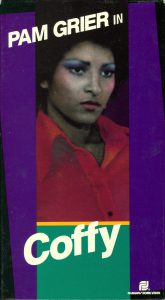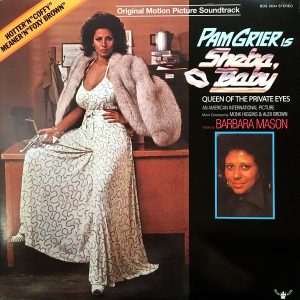Sheba, Baby (1975) by #WilliamGirdler#PamGrier #AustinStoker #DUrvilleMartin
A Chicago P.I. goes home to Louisville to stop mobsters forcing her father out of business.
"Queen Of The Private Eyes."#Crime #Blaxploitation#NotQuiteClassicCinema pic.twitter.com/DWPtDCF2JM
— Angus Kohm (@AngusKohm) February 27, 2021
In all likelihood, the first place I ever saw Pam Grier was on The Love Boat (1977–1987). I watched that show every Saturday night when I was a kid. I wouldn’t have had any idea who Pam Grier was at that point, but it was probably my first glimpse of her. Flash forward a few years and I rented a movie called Women in Cages (1971). This could have been the first time I saw Pam Grier knowing that she was Pam Grier, but I’m not sure. The movie that I remember specifically renting because Pam Grier was starring in it was Coffy (1973). Coffy was the first of what could be called the Big Four Pam Grier Blacksploitation Pictures: Coffy, Foxy Brown (1974), Friday Foster (1975) and Sheba, Baby (1975). All four of the movies were named after the character that Grier played in the movie, and all four were available to rent in matching VHS boxes. I don’t think I realized that Coffy was the first one in the series. Somehow it just found its way into my hand on that day and I took it home.
 I enjoyed Coffy very much, and I eventually bought a copy on VHS that looked exactly like the one pictured to the left. I rented Foxy Brown and Friday Foster fairly quickly after watching Coffy, but I did not rent Sheba, Baby. This is because I had read reviews that suggested that Sheba, Baby was the weakest of the Big Four Pam Grier movies. In fact, I had read reviews that said Sheba, Baby was downright bad. I guess I didn’t want to tarnish the experience of the other three movies by watching this one.
I enjoyed Coffy very much, and I eventually bought a copy on VHS that looked exactly like the one pictured to the left. I rented Foxy Brown and Friday Foster fairly quickly after watching Coffy, but I did not rent Sheba, Baby. This is because I had read reviews that suggested that Sheba, Baby was the weakest of the Big Four Pam Grier movies. In fact, I had read reviews that said Sheba, Baby was downright bad. I guess I didn’t want to tarnish the experience of the other three movies by watching this one.
Years later, I found a copy of Sheba, Baby for sale in a bargain bin. I had already collected the other three movies, as well as The Big Doll House (1971), Women in Cages, The Big Bird Cage (1972), Scream Blacula Scream (1973) and Bucktown (1975). As a completist, I figured that I had to have Sheba, Baby in my collection as well – even if it was a disappointment – so, I bought it and took it home.
When I finally watched it, I was pleasantly surprised. Maybe my expectations were so low that I had perfectly prepared myself for this movie. It was the weakest of the Big Four in a lot of ways, but it struck me as a darn entertaining movie. Sure, it was basically a PG film rather than the hard R-rated fare that we had come to expect from Pam Grier. Sure, the violence was majorly toned down. Sure, there was only a brief glimpse of partial nudity instead of the eye-popping exploitation on display in many of the other films. Truth be told, Sheba, Baby was actually pretty tasteful – which is why some appreciators of the other three Big Four movies dismissed it. But I watched it KNOWING all that stuff and I was prepared to hate it… but somehow I just couldn’t.
 From the very first frame of the film I knew I was in for a good time. The music, by Monk Higgins & Alex Brown, instantly grabbed my ears and held on tight. By the time we got to the opening titles of the film, and Barbara Mason began to sing, I knew that I had to have this soundtrack in my collection. Since then, I have listened to it countless times as I walk around the city streets wearing my iPod – much the way Pam Grier walks around the streets of Chicago during the opening credits of Sheba, Baby. (minus the iPod, of course). It’s a simple sequence in the movie, but for some reason it really spoke to me. And now I tell anyone who’ll listen that the soundtrack of Sheba, Baby is the perfect walking music.
From the very first frame of the film I knew I was in for a good time. The music, by Monk Higgins & Alex Brown, instantly grabbed my ears and held on tight. By the time we got to the opening titles of the film, and Barbara Mason began to sing, I knew that I had to have this soundtrack in my collection. Since then, I have listened to it countless times as I walk around the city streets wearing my iPod – much the way Pam Grier walks around the streets of Chicago during the opening credits of Sheba, Baby. (minus the iPod, of course). It’s a simple sequence in the movie, but for some reason it really spoke to me. And now I tell anyone who’ll listen that the soundtrack of Sheba, Baby is the perfect walking music.
I also loved the fact that Pam Grier plays a private detective in this movie. I’ve always been partial to private detective stories; movies like The Maltese Falcon (1941), of course, but also the TV shows of my youth, like Remington Steele (1982–1987). Remington Steele is about a brilliant female private detective who has to create a fake male detective boss in order to get hired. Surprisingly, Sheba Shayne also has a male detective partner/colleague, and he seems to be the less competent member of the team. We don’t learn very much about him, because Sheba almost instantly finds herself travelling to Louisville to help her father, who has run afoul of some nasty gangsters.
Sheba’s father’s business associate is played by Austen Stoker, whom I have liked since first seeing him in Assault on Precinct 13 (1976). And since he is in the opening scene of Sheba, Baby, this might be another reason that I found myself instantly enjoying the movie. We eventually learn that Stoker’s character, Brick Williams, shares a bit of a romantic history with Sheba – and the two of them wind up working together to defeat the bad guys.
There is plenty of action in Sheba, Baby. It’s just not the edgy, extremely violent kind of action that is present in films like Coffy. I suspect that the producers must have been interested in reaching a more general audience with this film. I’m not sure if it worked. Some have suggested that this movie marked the end of Pam Grier’s reign as Queen of Blaxploitation movies – even going so far as to blame this movie for ruining the winning formula (extreme violence and exploitation). I’m not sure that the filmmakers made the right choice in toning things down for Sheba, Baby, but I have found that the movie has grown on me more and more every time I watch it. In fact, I may have watched it more times than any of the other Big Four Pam Grier films. Not because I think it’s the best. Objectively, I know that it’s not the best. But somehow I find it irresistible.
Sheba, Baby was directed by William Girdler, who is best known for making Grizzly (1976) and The Manitou (1978). He also made another not quite classic Blaxploitation film called Abby (1974) – and probably could have gone on to make many more cinematic delights – but, sadly, he died two years after completing Sheba, Baby, at age 30.
D’Urville Martin plays Pilot, one of the main bad guys. He was in many great Blaxploitation films, such as Black Caesar (1973), Five on the Black Hand Side (1973), and the legendary Dolemite (1975). Sadly, he died in 1984 at the age of 45.
Sheba, Baby (1975) is not the greatest Blaxploitation film; it’s not the greatest Pam Grier film. It’s probably not even the greatest William Girdler film. But for some reason, it’s one of my personal favourites. It’s the kind of #NotQuiteClassicCinema that I could watch – and enjoy -on any #FridayNightAtTheHomeDriveIn.
